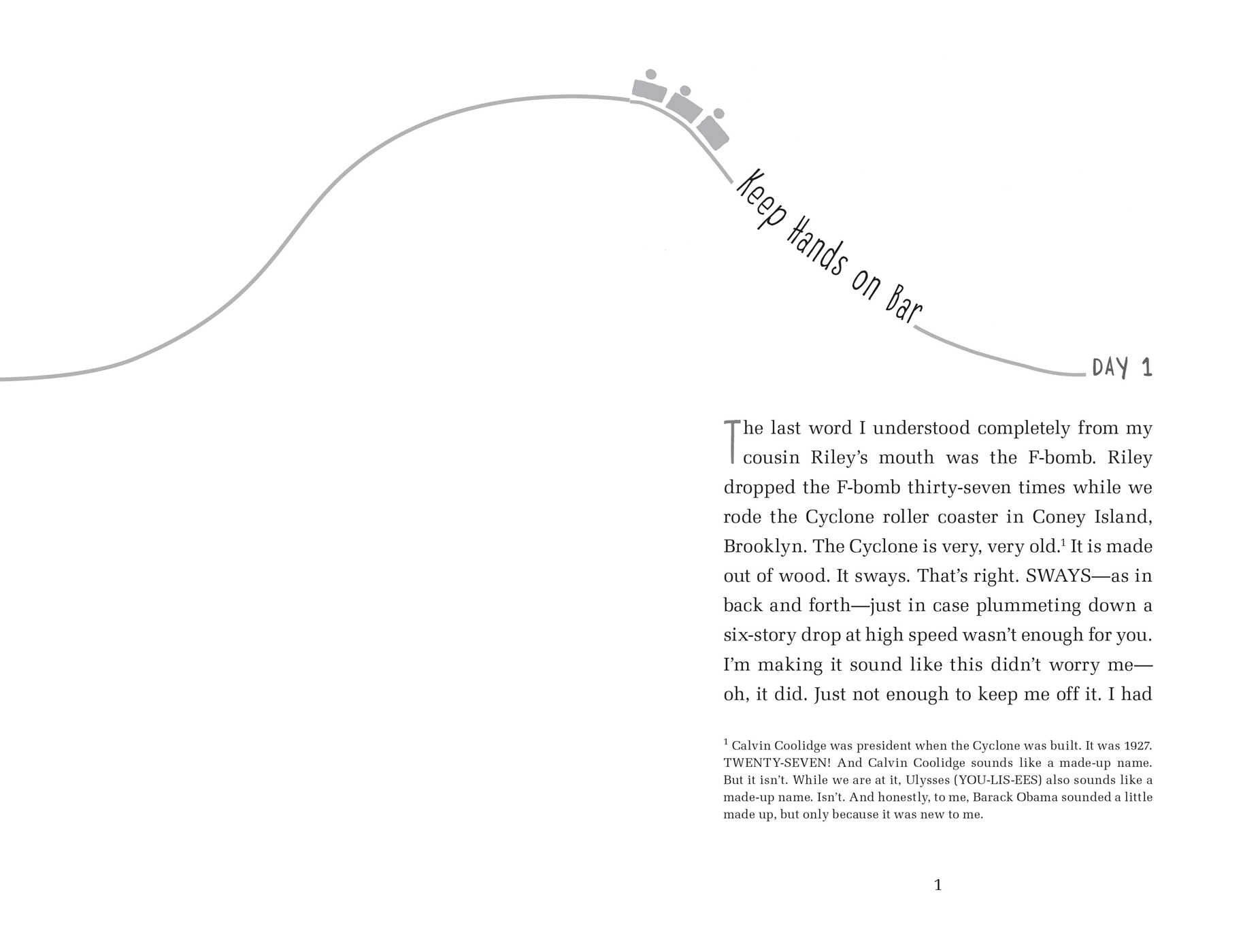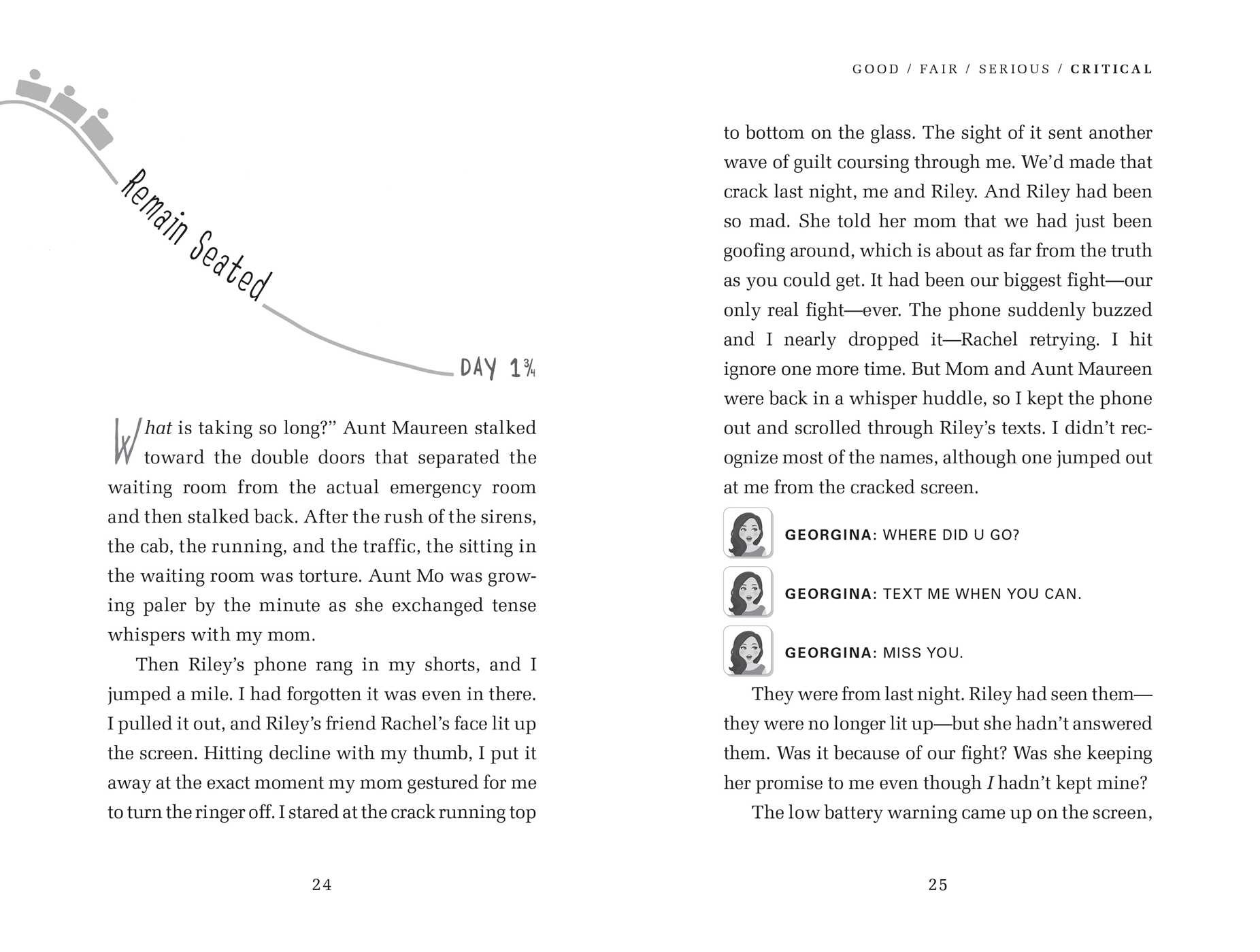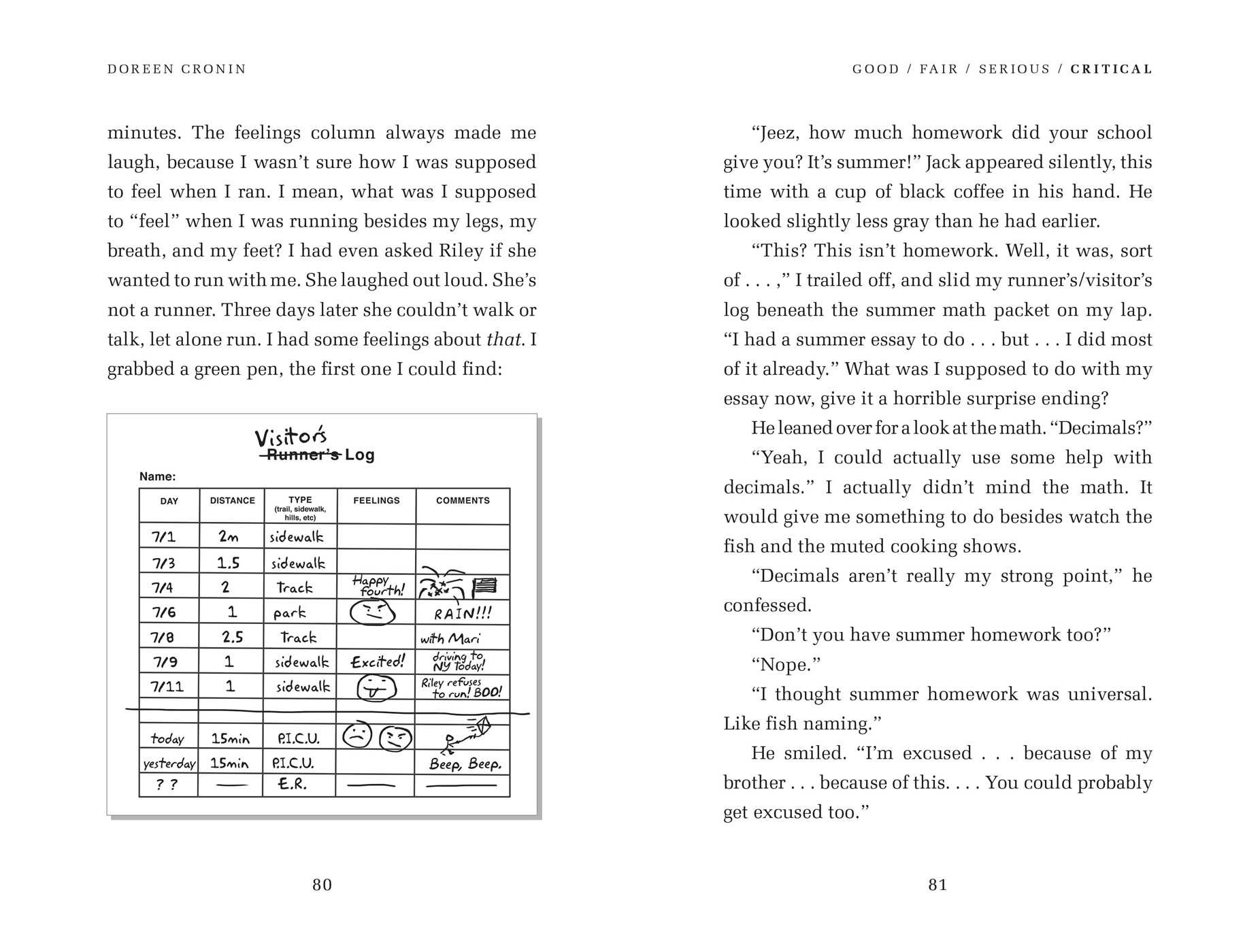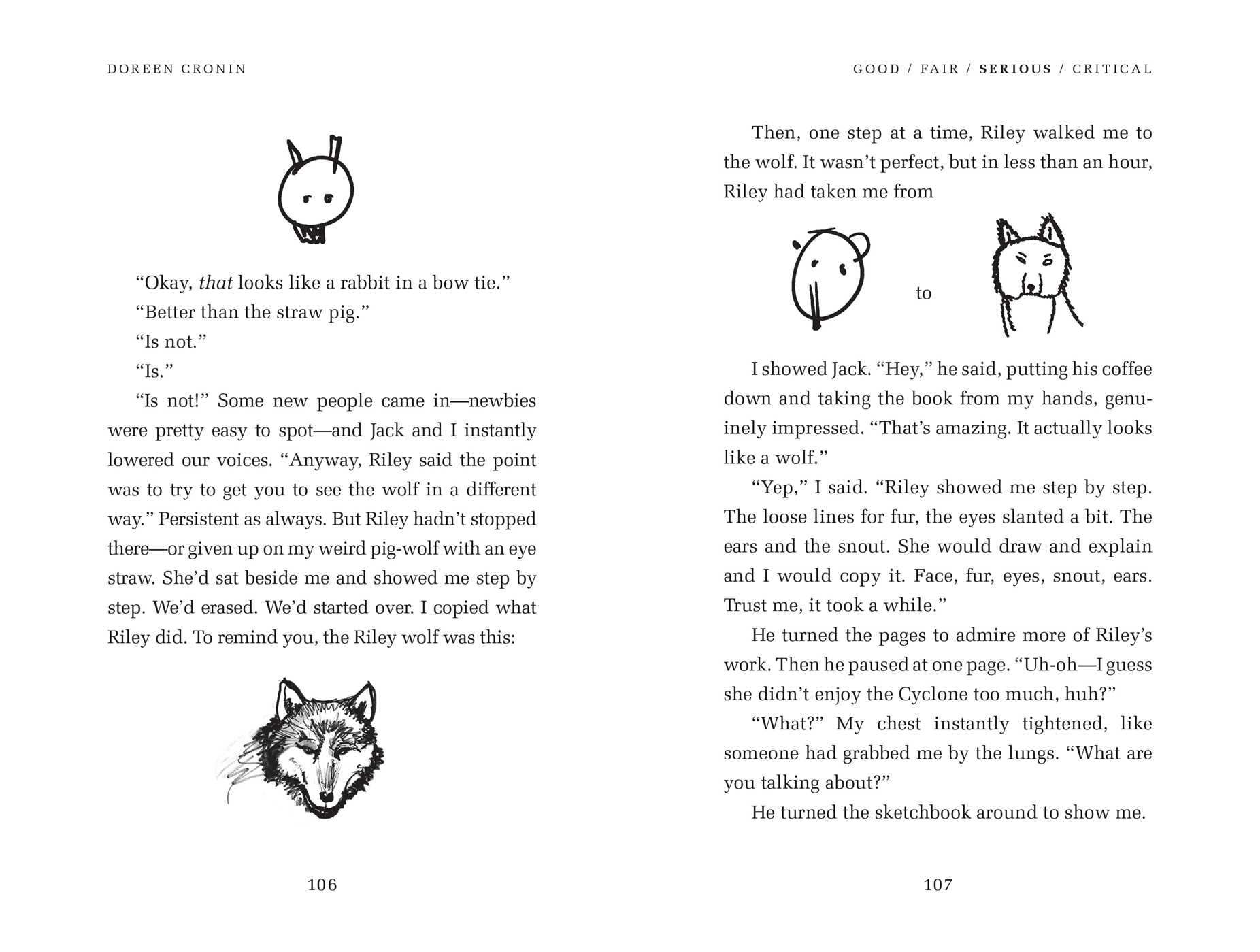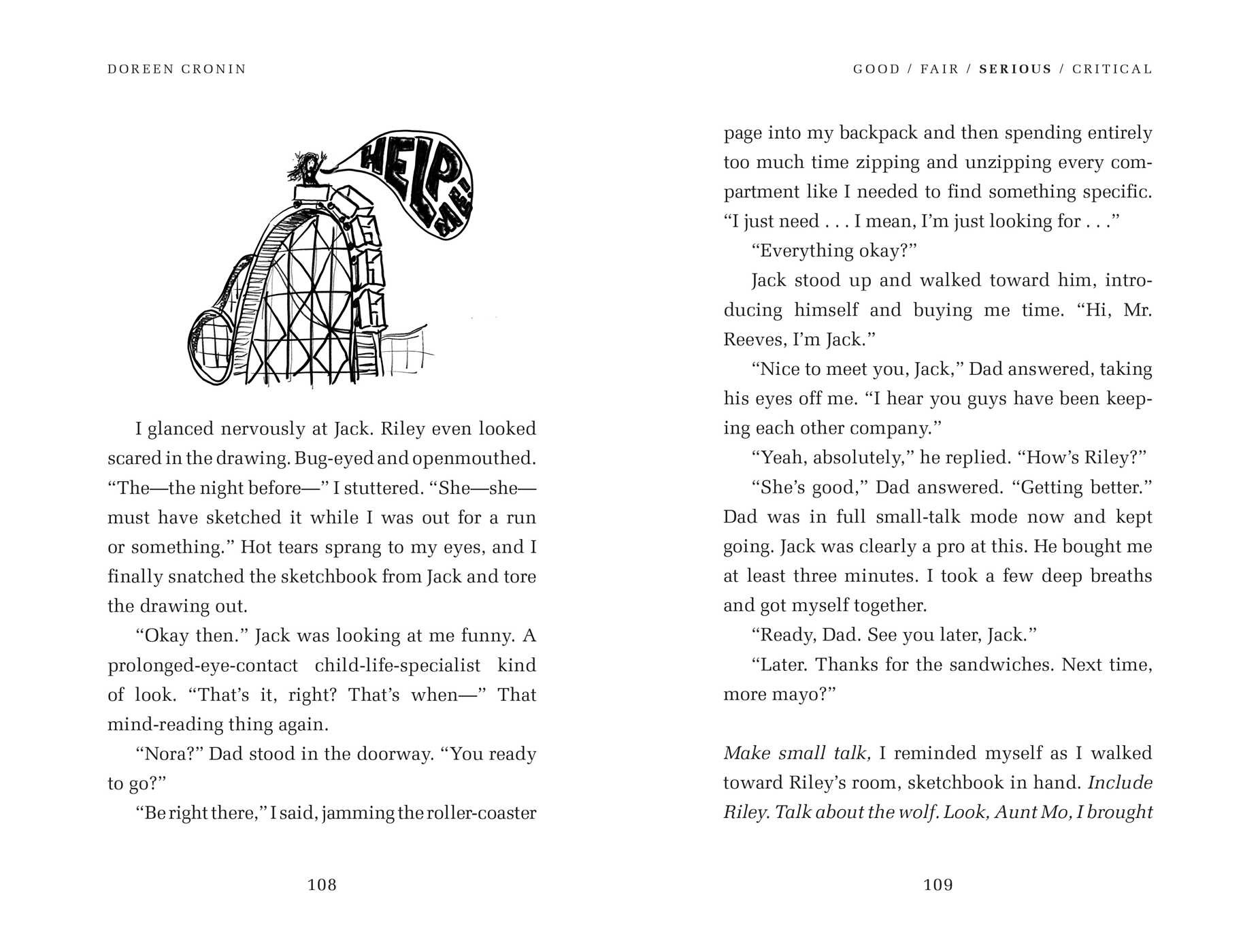Plus, receive recommendations and exclusive offers on all of your favorite books and authors from Simon & Schuster.
Table of Contents
About The Book
Riding the Cyclone, the world famous Coney Island rollercoaster, was supposed to be the highlight of Nora’s summer. But right after they disembark, Nora’s cousin Riley falls to the ground…and doesn’t get up. Nora had begged and dragged Riley onto the ride, and no matter what the doctors say, that she had a heart condition, that it could have happened at any time, Nora knows it was her fault. Then, as Riley comes out of her coma, she’s not really Riley at all. The cousin who used to be loud and funny and unafraid now can’t talk, let alone go to the bathroom by herself. No, she’s only 10% Riley. Nora, guilt eating her up on the inside worse than a Coney Island hotdog, thinks she knows how to help. How to get 100% Riley back. But what Nora doesn’t realize is that the guilt will only get worse as that percentage rises.
Excerpt
DAY 1
The last word I understood completely from my cousin Riley’s mouth was the F-bomb. Riley dropped the F-bomb thirty-seven times while we rode the Cyclone roller coaster in Coney Island, Brooklyn. The Cyclone is very, very old.1 It is made out of wood. It sways. That’s right. SWAYS—as in back and forth—just in case plummeting down a six-story drop at high speed wasn’t enough for you. I’m making it sound like this didn’t worry me—oh, it did. Just not enough to keep me off it. I had waited a long time to be tall enough (fifty-four inches!) to get on that roller coaster. So I was determined, despite being a little afraid, to take my finally four-and-a-half-foot twelve-year-old self on the oldest wooden roller coaster in the world.
The truth is, I was more than a little afraid of going on the Cyclone. As much as I desperately wanted to ride it—it’s famous, after all—I very desperately did not want to ride it alone. My parents wouldn’t go. Heights make my dad turn green, and Mom is not a roller-coaster kind of person. Aunt Maureen—Aunt Mo for short—was out of the question. She gets dizzy on the merry-go-round, so that left my cousin Riley, and she is not a big fan of roller coasters either. But she was going on that thing with me—because I was determined. The Cyclone was the reason I bugged my dad to bring us to Brooklyn during our yearly trip to Long Island to visit my cousin and aunt. I had even prewritten most of my summer essay on it!2 The assignment was almost done, too. I just needed the part where I actually rode the roller coaster. I was now absolutely, positively ready for the Cyclone! At least I thought I was until I was standing in its shadow looking up at it. It looks much smaller on the Internet.
“It’s all yours.” My dad slapped two Cyclone tickets into my hand with a shake of his head, and I slapped one of them right into Riley’s. Riley barely acknowledged me, staring as the roller-coaster cars climbed slowly up to the top of the first drop. Click-click-click-click. Riley was already having some serious doubts and insisted that we watch it a few more times. Metal gates and high fencing surrounded its base, making it seem like a dangerous, caged animal. Riley was sure gaping at it like it was. I wished the people riding it weren’t screaming so loud; that wasn’t helping either.
“Mom,” Riley finally said, “you should go with Nora. You said you loved roller coasters!”
“Twenty years ago,” Aunt Maureen clarified, taking a step backward, away from the ride. “Not now.”
“We’ll meet you back here in half an hour,” said my mother. “For the record, I think you’re both crazy.” At that, she and my dad and aunt turned and headed toward Nathan’s Famous, leaving us gazing up at the monster ride. It took up an entire block. It even had its own address: 1000 Surf Avenue, Brooklyn.
“Let’s get a hot dog too!” said Riley, apropos of nothing, pulling me in the direction our parents had just gone. “I love hot dogs!”
“You do not love hot dogs.” I swung her back toward the roller coaster. “You tolerate hot dogs.” It was true. She felt the same way about hot dogs as I do about scrambled eggs—I’ll eat them as a last resort, but that’s it.
“But these are famous hot dogs!” she practically sang. It was a desperate—and lame—argument, and she knew it.
“Trust me on this, Riley,” I said. “The time to eat a hot dog is not right before you get on a roller coaster.” The clicking stopped, and we looked up again.
Riley pointed to the four flags whipping around in the wind at the top of the roller coaster—right above where the roller-coaster cars somehow seemed suspended for a second. “What does it say there?”
“I can’t see from here,” I flat-out lied. LAST WARNING. REMAIN SEATED. Riley gasped as a train of coaster cars was suddenly let loose and roared toward the ground. The screams picked up a notch, too.
“How high up is that?” Riley asked.
“I’m not sure.” Second lie.3 The coaster shot around a tight curve at the bottom of the drop and headed up again.
“Oh my God, how fast is that thing going?”
“Pretty fast.” Vague lie.4
Riley jabbed a finger at me. “I am in charge of the seat belt. We are going to pull it so tight that it cuts off our circulation. Do you hear me?”
“As tight as you want.” Lie of omission.5
“This is going to be the scariest three minutes of my life!”
“It will be over in less than two!” At last, a truth.6
“It better be,” she said. We took a few steps toward the Cyclone line, but then she stopped short. “You know what? I’m really hot. Let’s go swimming first.” She grabbed my arm again and tried to pull me toward the beach. “We’ll go swimming and then we can dry off on the roller coaster.”
“No.” I pulled her back toward the line, a little too hard. “We only have about twenty-five minutes left before Dad comes back. And you know he’ll say, ‘It’s time to go, I don’t want to sit in traffic, we have to leave,’ ” I said in my best dad voice, “and then I’m pretty sure he’ll never come back to Brooklyn again and then I’ll never get a chance to go on the Cyclone. Today is the day.” Dad had very little car patience. He had already threatened to turn back around this morning when it took twenty minutes to find a parking spot. The spot we finally found was so far away he wasn’t even sure if we were still in Brooklyn.
“Come on, Riley!” I was begging now. I was not above begging. “It will be awesome!”
Riley eyed the cars bolting around a curve in the track. “It’s not going to be awesome when I throw up all over you!”
“Listen to me. Remember how you didn’t want to boogie board when we went to Bethany Beach two summers ago because the waves were too big?”
“Yeah.” Her eyes went wide. The coaster was barreling down a plunge.
“Well, you loved it, right?” I stepped into her line of vision so she had to look at me.
“Yeah, but this is different.”
“No, it isn’t.”
The key to keeping Riley calm was to keep her talking. If she was talking, she was good.
“What if I really do throw up?” Riley asked. She was now twirling a handful of her hair into a long rope. A thick, black, kinked-up-because-her-hair-is-so-curly rope. It actually looked like something I might be able to hold on to. Not a good thought, for either of us.
“You won’t. And stop torturing your hair,” I said. “Besides, even if you do, it won’t gross me out, I promise!” I vomited once after a long run. My heart was racing and it was crazy hot out, and, honestly, I wasn’t feeling very well that morning, but I wanted to run. So, yep, right there at the end—plehhh! I was mortified at the time, of course, but apparently, I wasn’t the first person to puke after a long run on a hot day. I’m pretty sure Riley wouldn’t be the first person to puke after a roller-coaster ride either. I eyeballed the current load of passengers, looking for potential pukers. Oh God, don’t let Riley see anybody puke when they get off this thing. . . .
“You’re gross, Nora!” But she did let go of her hair. “Fine. Fine already. But you owe me a hot dog! If I throw up, you owe me two!”
“Deal!” I whooped. I did not point out the painfully obvious—that eating two hot dogs after vomiting was a lousy idea—because I didn’t want her thinking any more about the possibility. Riley was afraid; she might actually throw up. But Riley, being who she is, knew I really wanted to go, knew she was my only hope, and didn’t want to disappoint me on my first—and likely last—visit to Coney Island, Brooklyn. That’s the kind of cousin she is.
“Okay, let’s get this over with already!” All right! I knew she would come through!
The line to get on the Cyclone was designed like a switchback trail, zigzagging back and forth to get to the front, and lucky for me, it wasn’t very long—less time for Riley to lose her nerve and change her mind. I have to admit my legs already felt a little shaky—my stomach, too. Riley trailed a few steps behind me, so I waited for her to catch up. We stepped aside to let a group of kids—who had all clearly reached the fifty-four-inch mark younger than I had—screaming, “First car! First car!” dash past us. I didn’t even want the first car, so I was happy to let them pass. We changed direction at the end of the row. Riley stopped to wave to her mother, who had changed her mind and stayed behind. She waved back—our official send-off. I tried to pick up the pace, but the closer we got, the slower Riley walked. I grasped her hand to urge her along.
“I’m nauseous already,” she said with a laugh, but she was squeezing my hand really tightly. And I was glad, partly because I could keep her from bolting and partly because my own stomach was getting progressively questionable. Riley didn’t look so hot either. But I kept right on moving, up, up, up—ten more feet, through the turnstile, and we’d be on the loading platform!—so when Riley stopped short again, I almost fell backward. Riley wasn’t looking at the platform—she was looking at the first hill that loomed over us, five stories high. And she didn’t look the laughing kind of scared anymore; she looked really scared. She let go of my hand.
“I’m not doing it,” she said. Screams pierced the air as the cars plummeted down the first hill. “Nope. I’m done.” And she turned around to leave.
“Chicken!” the kids standing behind us teased.
“Riley—c’mon, we’re almost there! You can do this, I know you can.” I grasped her hand again, and somehow, the line shifted forward and she let me pull her through the turnstile onto the front of the loading platform. The next round of cars would be ours. Riley looked like she was going to cry.
“Riley, you can do this,” I said, using my calmest voice, even though my internal voice was shrieking, Oh my God, we’re nearly there, just do it! The cars pulled into the loading area. Some of the riders were laughing and others were yelling and cursing. One lady’s face was drenched with sweat; she still had her eyes closed. The bars lifted and the cars started to empty. “See?” I waved my hand toward the outgoing riders. No pukers! “Everybody survived!”
The guy who was the roller-coaster loader was tall and cute—exactly the distraction I needed. “C’mon, gorgeous,” he crooned, winking at Riley. “It’s fun. Trust me.” Then he barked at the closed-eye lady and two last kids to get off.
“Man, that was awesome!” the kids exclaimed, dropping a few happy F-bombs themselves, high-fiving each other as they climbed out of the car. “Let’s get back in line!” I raised my eyebrows at Riley, in a see, it’s awesome way. Riley, however, was now looking over their heads at a sign to our left that read: WARNING: THE CYCLONE ROLLER COASTER IS A HIGH-IMPACT RIDE. ANY PERSON WITH BACK, NECK, OR HEART PROBLEMS SHOULD NOT RIDE THIS RIDE. NO PREGNANT PERSON SHOULD RIDE. HOLD ON WITH BOTH HANDS. It might as well have said THIS IS REALLY FAST AND DANGEROUS AND YOU WILL ABSOLUTELY THROW UP. TURN BACK! LAST CHANCE! DON’T DO IT!
But Cute Roller-Coaster Loading Boy came to the rescue once again. My mother says Riley is “boy crazy,” but she got attention whether she was looking for it or not. She was curvy with that wild, dark hair and cocoa-brown eyes and, almost always, except for right now, a megawatt smile. Loading Boy smiled at Riley and held out his hand to help her into our car—the third one from the front. Psych! There was no way she was going to chicken out in front of him. Riley took his hand and climbed. Loading Boy did not keep his hand out for me. Riley looked offended on my behalf, but I wasn’t there for cute Brooklyn boys; I was there for the roller coaster. “Scooch over!” I said. She slid to the far side. We were in!! And Riley couldn’t get out. Success!!
The cars around us filled quickly, with lots of giggles and excited screams. The bar came down and Riley gave it a good, hard shake to make sure it was locked. Loading Boy did the same. I guess Riley forgot about the seat belt. Then she made the sign of the cross, just like Aunt Maureen always did whenever she saw something terrible on the news or found out that somebody died. I was not sure what her mother would think of this casual use of the gesture.
“Ready?” I asked, grinning at my cousin. The car lurched forward and began to slowly rise up the tracks. Click-click-click. My heart began to race. We click-click-clicked past another sign: KEEP HANDS ON BAR. THIS MEANS DO NOT PUT HANDS UP.
Riley dropped her first F-bomb. To be fair, she wasn’t the only one. Click-click-click. A chorus of profanity rose up around us. The car rose higher. A tingling feeling traveled up my legs and exploded in my stomach. I made the sign of the cross with one jittery hand, the other tightly wrapped around the safety bar.
F-bomb, F-bomb, F-bomb from Riley as we rolled slowly up the first incline. Another sign. FINAL WARNING. REMAIN SEATED. The car rose higher. The flags we had seen from the ground whipped and waved wildly above our heads. Another heavy click sound and we were suddenly suspended at a steep, terrifying angle, gravity practically plastering me to the seat, reminding me how much my body preferred solid ground. Slowly we rose again, our car finally teetering at the top, and then we plunged. Plunged. My hair went wild, my face flattened by the pressure and speed of the drop. On the first sharp turn, Riley’s body weight shifted, smashing me against the metal wall of the car, adding to the violent sensations of shaking and rattling that were already flooding my body.
“AAAAAAAAHHHHHH!!!!!” I screamed without choice. And I couldn’t stop screaming. Not for one minute, fifty seconds. I was doing it! I was riding the Cyclone! I was riding the oldest, shakiest roller coaster in the world! And just like that, the cars slowed as we approached the loading platform—it was done.
The bar flipped up. Cute Roller-Coaster Loading Boy helped Riley out of the car, and I, thank you very much, got myself out. I held on to Riley as soon as her feet hit the platform to steady myself. We went down the ramp hand in hand and only let go of each other just long enough to pass through the bright red revolving-door exit gate. The crowd of nonriders, mostly parents—mine, Riley’s, the other kids’—were walking toward us, all grinning from ear to ear. My legs were still wobbly, my adrenaline still pumping, I was light-headed—and even a little nauseous. It felt just like crossing the finish line of the Bull Run Invitational cross-country meet (minus the vomit!). Riley held up her phone to take our selfie with the Cyclone behind us. We were arm in arm again and all smiles.
Awesome, right? Except it wasn’t.
Because after we got off the Cyclone—after all the researching, writing, footnoting, begging, whining, Loading Boy smiles, sign-of-the-cross-ing, body smashing, and F-bombing, and immediately after the flash went off on her pink phone—my thirteen-year-old cousin, Riley, slipped through my arm and collapsed at my feet.
1 Calvin Coolidge was president when the Cyclone was built. It was 1927. TWENTY-SEVEN! And Calvin Coolidge sounds like a made-up name. But it isn’t. While we are at it, Ulysses (YOU-LIS-EES) also sounds like a made-up name. Isn’t. And honestly, to me, Barack Obama sounded a little made up, but only because it was new to me.
2 Footnotes and all; with the lackluster title of “The Reeves Family Summer Vacation.”
3 Eighty-five feet.
4 Sixty mph.
5 No seat belts, just a lap bar.
6 One minute and fifty-five seconds, to be exact.
Reading Group Guide
Get a FREE ebook by joining our mailing list today! Plus, receive recommendations for your next Book Club read.
Cyclone
By Doreen Cronin
About the Book
Riding the Cyclone, the world-famous Coney Island roller coaster, was supposed to be the highlight of Nora’s summer. But right after they disembark, Nora’s cousin Riley falls to the ground and doesn’t get up. Nora had begged and dragged Riley onto the ride, and no matter what the doctors say—that she had a heart condition, that it could have happened at any time—Nora knows it was her fault. Then, as Riley comes out of her coma, she’s not really Riley at all. The cousin who used to be loud and funny and unafraid now can’t talk or go to the bathroom by herself. No, she’s only 10 percent Riley. With guilt eating her up on the inside even worse than a Coney Island hot dog, Nora thinks she knows how to help get 100 percent Riley back. But what Nora doesn’t realize is that the guilt will only get worse as that percentage rises.
Discussion Questions
1. While Nora is waiting to ride the Cyclone, she feels both determined and afraid. Have you ever felt this way? Has your determination ever pushed you to do something when your gut is telling you not to? Why do you think it’s so important for Nora to take this ride?
2. Can you understand the attraction to scary rides, movies, and experiences? If you like scary things, can you explain why? If not, share why you don’t enjoy these experiences. What is the scariest thing you’ve ever done? How did you feel after it was over?
3. Have you ever exerted your will over a friend, as Nora does with Riley? Did you feel sorry afterward? Guilty? Were there consequences? Have you ever let a friend persuade you to do something? Why do you think that young people give in to peer pressure? Can you name some examples of dangerous things that teens persuade each other to do?
4. After Riley collapses, Nora recounts all she did not do for Riley: she didn’t call 911, she didn’t get down on the ground, etc. Why didn’t she do more to help her? What might Riley have done if it was Nora who collapsed? What would you have done? Have you ever witnessed an accident or incident like this? How did it make you feel?
5. Aunt Maureen tells Nora that Riley’s stroke “‘might have been the very best bad thing that could have happened.’” Talk about why she feels that way. Do you think that hearing this helped to alleviate Nora’s enormous feelings of guilt? Can you share an example from your own life where an initially bad experience actually turned out to be a good thing?
6. How does the book’s title manifest itself throughout the events of the book? What do you think are the other major themes? How do the characters’ actions support these themes? Can you suggest some subthemes as well?
7. Nora observes many of the adults lying at one point or another: not being honest about Riley’s condition at first, saying that they are “all right” when that’s clearly not true. Even Riley lies about “Georgina.” In your opinion, are these lies justified by the unfolding events? Is there ever a good reason to tell a lie, or is it more important to always tell the truth? Can you give examples of lies you’ve told or ones that were told to you that were motivated by a desire to protect someone?
8. Family dynamics are at the heart of this story: siblings, cousins, parents, and children all intersect in interesting ways. Describe how Riley’s collapse affects the family in both good and bad ways. Give examples of how both are exhibited in scenes from the book.
9. At one point, Nora says, “‘I had never once seen my dad look scared before.’” Have you seen your parents scared? What were they afraid of? What are you most scared of?
10. What does it mean when the girls refer to “tomato soupin’”? Is this a philosophy that you can get behind? Does your family have any unique expressions like this?
11. For most of the book, we only see Riley through other characters’ eyes. Nora says that Riley “really was one of those people who it is always good to see.” Does being told that Riley has a potentially dangerous secret impact your view of her? Did your assumptions and feelings about Riley change when she woke up and began interacting with the other characters? How?
12. Nora says that Monica is “managing my expectations.” Discuss what she means here, and give examples from the book of occasions when the adults do this. Can you share examples from your own life of times when adults managed your expectations?
13. “‘One person is always a little bit left out when there are three,’” Jack says to Nora. Discuss the triangles formed by relationships in the book. Have you ever been involved in a friendship, romantic, or familial triangle? Do you agree with Jack? Can you think of any positive examples of triangles?
14. Why do you think Jack and Nora don’t talk about medical things very much? Why do the other families pretend not to see when difficult things happen in the hospital, such as family arguments and “Code Blue” incidents? Do you think this is a respect for privacy, or do they find it embarrassing to witness such intimate incidents?
15. Discuss how the hospital setting influences theme, plot, and character. How might the story have differed if Riley had only been in the hospital for a few days and done more recovering at home? Did you find the medical footnotes helpful? Were any of the medical terms new to you?
16. Aunt Elayne says to Nora, “‘You can be sad and still be okay.’” After reading this book, do you agree with this idea?
17. When Nora gets mad because her summer is ruined, what was your reaction? Did you understand how she felt? Consider her friendship with Jack: Is he getting as much out of their connection as Nora is? Overall, did you find her to be a likeable character, or would you have been better friends with Riley or Sophia?
18. Aunt Maureen could “see past 20 percent Riley.” Discuss the role of hope in the story. Which characters are the most hopeful? Why is it easier for some people to hope than others? What happens when hopes are dashed, such as when Jack’s brother dies?
19. Until she had a big secret to keep, “Riley was the only teenage girl in the world who didn’t want privacy.” Talk about the fight that Nora and Riley have about the older boy. Was Nora right to be worried and protective? What would you do if you discovered that one of your friends was doing this? Is telling the truth worth risking a friendship?
Extension Activities
1. The sentence that Nora thinks sounds so horrible is also a miniature summary of the book: “My cousin had a stroke at the amusement park.” Choose 5-10 other books that you’ve read, and distill them down to one sentence each.
2. Put yourself inside Nora’s head, and write a letter to Riley apologizing for the events that transpired.
3. Put yourself inside Riley’s head, and write a letter to your father telling him what happened to you.
4. Choose one of the following to research, and then write a report about it.
Investigate old roller coasters, including the Cyclone. When were they first created, and how safe were they? How were they constructed as opposed to today’s standards? How has the design expanded or changed?
Pick one of Riley’s favorite presidents: Ulysses S. Grant or Calvin Coolidge. What were some of their goals and policies? How did the American people feel about their leadership?
5. Choose one of the following statements from the book, and write an essay about how it plays out throughout the story. Consider theme, plot, and character.
Nora says: “‘Emergencies changed all the rules.’”
Monica tells Nora: “‘Be prepared for uncertainty.’”
Guide written by Bobbie Combs, a consultant at We Love Children's Books.
This guide has been provided by Simon & Schuster for classroom, library, and reading group use. It may be reproduced in its entirety or excerpted for these purposes.
About The Illustrator
Product Details
- Publisher: Atheneum/Caitlyn Dlouhy Books (May 16, 2017)
- Length: 352 pages
- ISBN13: 9781481435253
- Grades: 4 - 8
- Ages: 9 - 13
- Lexile ® 600L The Lexile reading levels have been certified by the Lexile developer, MetaMetrics®
Browse Related Books
Raves and Reviews
Cronin, famous for solving cow communication problems with a typewriter in Click, Clack, Moo: Cows That Type (2000) and sequels, offers her debut middle-grade novel illuminating human communication problems. Nora, 12, blackmails her cousin Riley, 13, into riding with her on the Cyclone, the Coney Island amusement park’s legendary roller coaster—and as soon as Riley steps off, she collapses from a stroke and is hospitalized, partially paralyzed and nearly unable to speak. In the waiting room, Nora meets Jack, a caring young teen, who says his younger brother is in the ICU with leukemia—although, sadly, he’s not telling the full story. Riley’s hospital stay drags on, including ample medical detail, and Nora’s and Riley’s mothers’ other sister arrives, ballooning the already-substantial tension. As Riley begins to talk a bit, most of her words are, astonishingly, in Spanish, dredged up from her middle school language lessons; only her Latina roommate, Sophia, is able to understand her. (Sophia and some hospital staff aside, the characters all appear to be white.) It’s only time, learning to listen, and a bit of emerging maturity that help Nora resolve these many communication problems, discovering poignant, hidden-in-plain-sight truths along the way. Her honest first-person (and thoroughly footnoted) voice believably moves from defensive and guilt-ridden to perceptive and empathetic as her understanding grows. A sensitive exploration of the high costs of failing to really connect with those around us. (Fiction. 10-14)
– Kirkus Reviews, 5/15/17
Awards and Honors
- CCBC Choices (Cooperative Children's Book Council)
- Kansas NEA Reading Circle List Junior Title
- Volunteer State Book Award Nominee (TN)
- Bank Street Best Children's Book of the Year Selection Title
- ILA Children’s Choices Reading List
- Maud Hart Lovelace Award Honor Title
Resources and Downloads
High Resolution Images
- Book Cover Image (jpg): Cyclone Hardcover 9781481435253
- Author Photo (jpg): Doreen Cronin Photograph (c) Doreen Cronin(0.1 MB)
Any use of an author photo must include its respective photo credit


